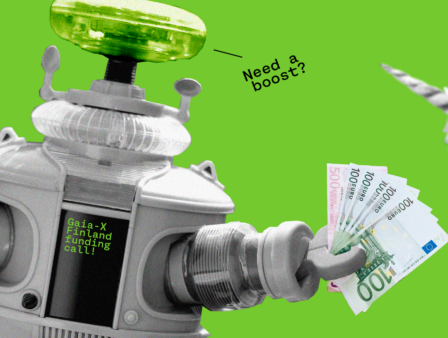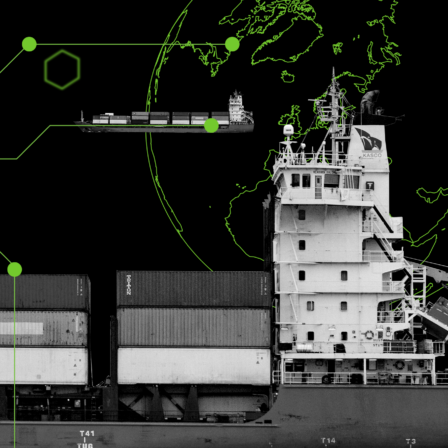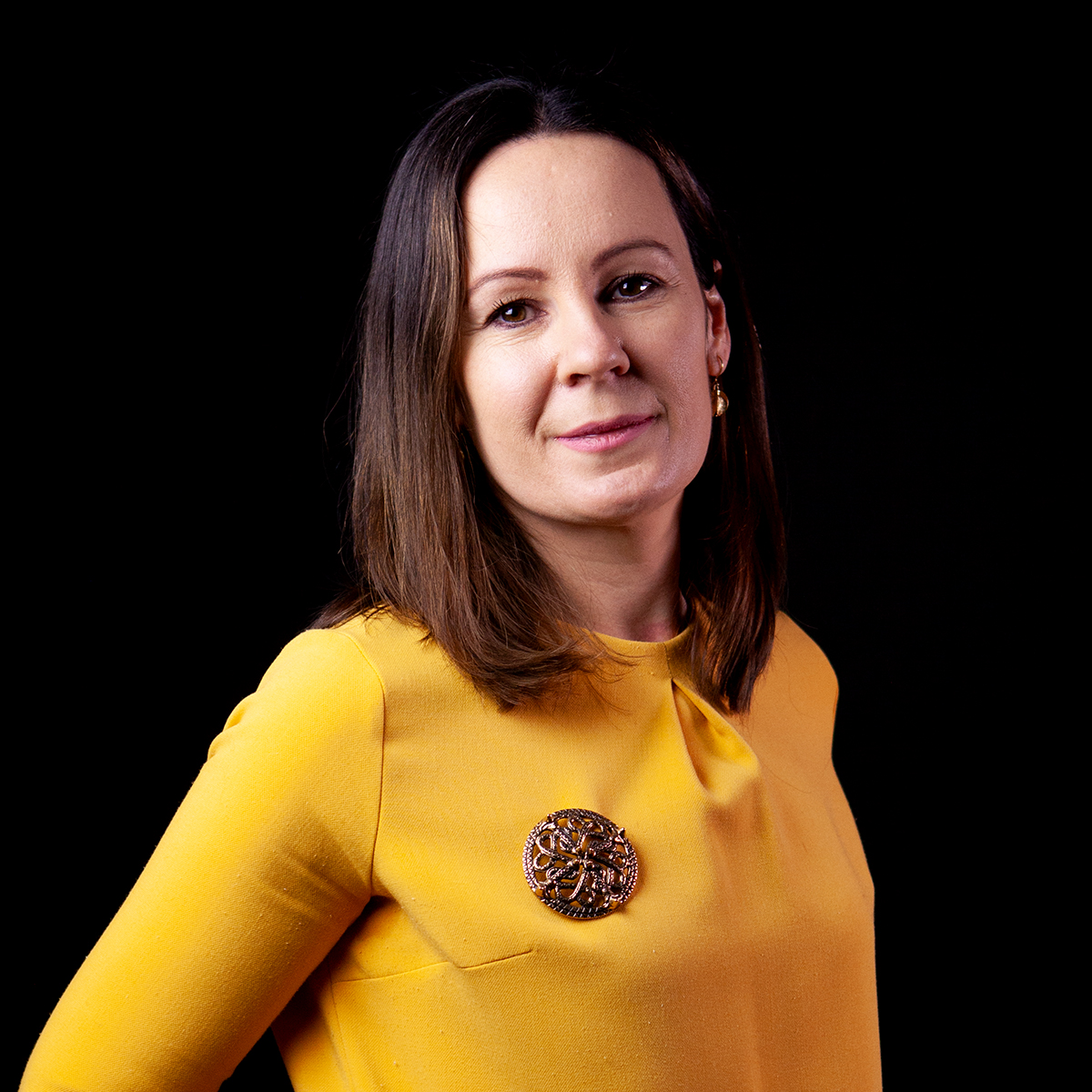Pilot projects – data sharing use cases
Gaia-X Finland issued a call for co-funding applications to co-create and learn about business value creation through data sharing. Five pilot projects in four data spaces were chosen to develop data products or services related to their data sharing use cases.
What is it about?
The European Data Strategy 2020 aims to accelerate the development of the European data economy. Gaia-X is a European initiative to develop the standard for data sharing between European countries. Gaia-X aims to be the de facto standard for building an interoperable data ecosystem, also known as a data space.
At Gaia-X Finland, coordinated by Sitra, we believe that such co-funding opportunities are important to bring more Finnish companies into the fair data economy, to contribute to the standardisation work of data spaces and, most importantly, for companies to understand the business opportunities of Gaia-X and to innovate by data sharing and working on different building blocks.
A data space is a tool that accelerates and scales data sharing between companies, creating innovations and new services at ecosystem level. It is a dispersed system defined by a governance framework that enables secure and trusted data transactions between participants, while supporting trust and data sovereignty. A data space is implemented by one or more infrastructures and enables one or more use cases.
The call for proposals was aimed at businesses and other organisations to experiment with the functioning and practical business benefits of the European Gaia-X framework, and business models for data sharing. The call was open for one year and closed in September 2023. The call registered more than 800 marks of interest and about 60 consortiums submitted their application with an average of three companies per consortium. Of these, five consortia were selected.
The selected consortia work in the maritime, agricultural, skills/talent and air cargo logistics sectors.
Each consortium was assessed against three sets of criteria: 1. real business value would be created through data sharing, 2. the project would adhere to the principle of a fair data economy and would have the potential to scale internationally, 3. the project would contribute to the development of Gaia-X in Finland and be interoperable with other data spaces on a European level.
Results in brief
Finnish Maritime Data Space initiatives: port arrivals and sea logistics ecosystem
In this pilot project, two use cases were combined to start building the first Finnish maritime data spaces. Both use cases aim to reduce costs and carbon emissions in cargo shipping and, interestingly and they apply two unique approaches.
In the Just-in-Time (JIT) port arrival scenario implemented by Awake.ai, a machine learning algorithm was used to forecast the Estimated Time of Arrival (ETA) of a vessel. This prediction takes into account various data points, such as near-real-time fuel consumption, Vessel Traffic System (VTS) data, meteorological information, and other port-related data. The use of these different data sources increases the accuracy of the vessel’s voyage planning prediction.
Results:
In Just-in-Time arrivals use case a custom cloud-based service and web application were developed on the Awake.AI cloud platform for project partner E&S Tankers, that monitored the status of E&S tankers fleet, predicted their schedules, estimated arrival times, and checked these estimates against planned schedules. It also calculated the optimal speeds for vessels to minimize time at ports while considering fuel consumption and emissions.
The custom web application was designed to be visual and clearly demonstrated the potential for optimising voyages. It also offered suggested changes to current vessel orders, such as speeding up or slowing down, to ensure that the vessel would arrive at the most opportune time.
Consortium partners: Awake.ai Oy, E&S Tankers
Schedule: The pilot project was completed in January 2024
The Siili Solutions’ Virtual Port Arrival (VPA) use case proposed a new approach to traditional docking practices. Previously, ships would rush to the port to secure their berthing slot and then wait at the anchorage, sometimes for several days, resulting in increased fuel consumption due to speeding. In contrast, the VPA use case experimented with a method allowing ships to virtually arrive in port. This is based on near-real-time data such as ship position and cruising speed, enabling them to secure their berthing slot without the need for actual speeding.
Results:
VPA pilot project showed that the emissions can be reduced by increasing operational efficiency through the use of VPA. By using the VPA method, a ship virtually ‘arrives,’ meaning it knows when a berth is available and can slow down to reach the port when there is space, without losing its turn, wasting fuel, or breaking any agreements. The pilot project involving ESL Shipping, Port of Oxelösund, Yara, and SSAB showed potential of reductions in CO2 emissions (over 24%) and energy consumption (more than 20% on average). VPA project was a concept project and a prototyping of a maritime data space. Therefore, no actual operations were conducted.
The primary target groups for the VPA project were stakeholders within the maritime industry who would benefit from enhanced port arrival processes and reduced emissions. These include shipping companies, ports and port authorities, charterers and cargo owners, maritime technology and service providers, and industry associations.
The project engaged 16 organisations and demonstrated ability to scale the VPA concept to different ports and stakeholders.
In the project, a technical prototype for the data space was developed. The prototype followed Gaia-X standards and successfully showed that secure and efficient data sharing between stakeholders is possible. This contributed a significant level of technical proof to the project.
Consortium partners: Siili Solutions Oyj, Fintraffic VTS, ESL Shipping Oy, Port of Oxelösund (Sweden)
Schedule: The pilot project wascompleted in February 2024
Both use cases were being orchestrated in a co-partnership with Fintraffic to kick-start the Finnish Maritime data space initiative in February 2024.
Mapping business value through data sharing in the air cargo data ecosystem: A look at the air logistics value chain
The aim of the pilot project was to identify the challenges effecting the efficiency of air cargo handling process and to pinpoint areas where data could be leveraged to improve that and clarify value creation potential for participants.
This pilot project involved the identification of critical business motivators and shared objectives among key stakeholders in the air cargo logistics ecosystem. The identified ecosystem includes various stakeholders from service and users (consignee, shipper) to handling agents, logistic service providers, freight forwarders, and airports, all working together. For instance, consider this hypothetical scenario: while it only takes three hours to transport cargo by air from Amsterdam to Helsinki the administrative process to clear the cargo through customs at the destination can take significantly more time.
In the project, the partners identified how data sharing could create business value and conceptualised a possible solution for such a data ecosystem.
Sitra co-funded this project, which included value chain analysis and mapping.
Results:
The project developed a clear plan for cargo data hub Helsinki and identified benefits to multiple air cargo operators in terms of business value.
The exchange of airport cargo data is currently inefficient, often varying in quality and lacking uniformity. Parties involved in handling cargo at the airport exchange shipment data with each other on a one-to-one basis.
The smooth handling of air cargo requires close cooperation and coordinated action between many operators. Up-to-date and comprehensive cargo information is important for different value chain participants in order to anticipate better and perform the work more smoothly and efficiently.
During the pilot project four key use cases were identified: 1. Shipment emission data collection and reporting, 2. Shipment dimension optimisation, 3. Digital customs processing, 4. Data market and cargo situational awareness.
Value potential analysis indicated that implementing these use cases could result in up to a 10% reduction in costs for airlines and associated cargo handling entities, including forwarders, shippers, cargo agents and operators.
Consortium partners: Fintraffic, Finnair Cargo Oy, Finnavia Oyj
Schedule: The pilot project was completed in October 2023.
Potato-X: Enhancing profitability and productivity in potato farming through cross-border agricultural data sharing
The project presented a collaboration between different participants, including Finnish potato farmers, an agricultural machinery manufacturer, the Belgian agricultural data ecosystem, and Finnish agricultural ecosystem builders.
The aim was to share data on all aspects of potato farming – from planning, ploughing, planting, and maintenance to harvesting. The data on soil quality, location, yield, and machinery use was shared between two data ecosystems. The ultimate goal was to create new business services and boost profitability and productivity for farmers. This was planned to be achieved by establishing standards, business rules, governance systems, and connectors to facilitate data sharing between the two ecosystems.
Results:
The project involved several work packages focused on enhancing data sharing and management in the context of potato farming data across Flanders in Belgium and Finland.
Connecting data sharing platforms focused on achieving technical and semantic interoperability between data exchange infrastructures and services, detailing service, and data product requirements, and establishing technical connectivity specifications. Pilot services using the data, facilitated an end-to-end data flow for yield data from an AVR harvester through multiple digital platforms, eventually integrating with a Farm Management Information System (FMIS) in Finland. This demonstrated how yield data could be shared, permissioned, and visualised in a user-friendly manner.
Automated data contract prototype aimed to specify and implement an automated data contract prototype to streamline policy enforcement and contractual agreements in data exchanges.
Rulebook for data sharing network was developed to guide the potato data sharing network and ensure proper data governance and contractual relations between two data intermediaries, DjustConnect (BE) and Tritom (FI), with potential for adaptation to other use cases. The rulebook was drafted on the basis of a model rulebook published by Sitra.
Consortium partners: 1001 Lakes Oy, DataSpace Europe Oy, EV-ILVO – Flanders Research Institute for Agriculture, Fisheries and Food, AVR Belgium (Farming machinery), Klåvus Group Oy Ab (Farmers),
Schedule: The pilot project was completed in May 2024.
Foresight for skills: Creating a data space for AI Tools to predict a company’s future skills needs
This pilot project involved building on the existing structures of a Gaia-X-compliant data space. The goal was to promote data sharing across different departmental silos within an organisation and external data related to skills.
The ultimate goal was to create an AI tool that can benchmark and learn from an organisation’s real-time data, comparing it to leading skills in the sector. This would enable the company to predict its future skills needs for the next one, three, or five years. As a result, the company gains foresight that can be translated into actionable human capital, resource, and skills development planning.
Results:
The pilot project involved creating a system – AI tool – that integrates various sources of skills data and employs artificial intelligence (AI) to predict the skills that will be necessary in a specific company or industry over the next one, three, and five years. This AI tool, not only assesses and learns from the current data of an organisation but also compares it with the top skills in the industry. This information is particularly valuable for companies and departments dealing with human resources and planning for skills development.
To implement the AI tool, the pilot project partners used a data platform called Prometheus-X, which complies with Gaia-X standards, developed by Visions. By using a connection tool, participants in the project were able to share their data, which enabled them to merge data from various sources and experiment with new ways of profit distribution. Additionally, it facilitated the creation of new data-driven products within this shared data environment.
Consortium partners: Headai Oy, Visions, Lightcast (Economic Modeling LLC doing business as “Lightcast”), Prometheus-X, ABB Oy
Schedule: The pilot project was completed in May 2024.





